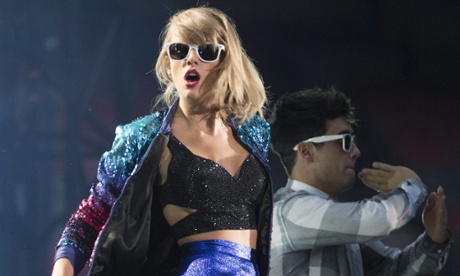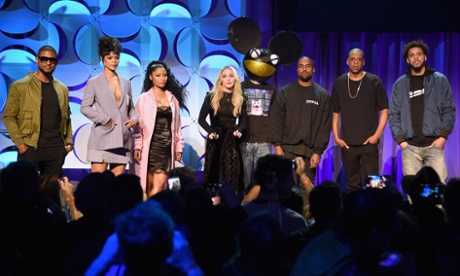Five years ago, the demise of the music industry seemed almost inevitable. Recession, rampant piracy, falling CD sales and a fear that “kids just don’t buy music any more” had giant record labels, once oozing wealth, counting the pennies.
Yet 2016 has seen a reversal of fortune – and the industry’s saviour is not what many predicted. Profits from music streaming, first championed by Spotify and now offered by Apple and Amazon, have given some labels their largest surge in revenue in more than a decade.
At the beginning of December, one of the world’s biggest labels, Warner Music, announced revenues of $3.25bn (£2.66bn) this year – its highest in eight years. More significantly, $1bn of that was from streaming, more than double its download revenue and more than $100m more than its physical revenue.
The surge in profits is being seen across all the major labels. In the first half of 2016, streaming revenue in the US grew by 57% to $1.6bn, and worldwide digital revenues overtook those from physical sales for the first time in music industry history, mainly because of streaming. This year’s most-streamed artist was Drake, with 4.2bn streams.
There are 90 million people signed up to streaming services worldwide and the shift, and the aggressive speed at which it has taken place, is having the greatest impact on music since digital downloads were introduced. It makes boycotts by artists such as Taylor Swift, who condemned Spotify for only paying between $0.006 and $0.0084 each time someone listens to a song, seem redundant.
Paul Smernicki, who was head of digital at Universal Records for 17 years before leaving this year to start his own venture, Restless Natives, said: “I thought the days of the music industry talking about anything in terms of millions were gone, but now we are looking at billions of streams on an almost daily basis. If you look at the the raw numbers of people who are streaming, I think you could now argue that music has never been more popular.”
Smernecki said streaming had democratised access to music by making it easy and cheap, even for those who were previously unwilling to buy it.
“The value of reliability, convenience and accessibility to an enormous catalogue of songs for a small cost now trumps illegally downloading a song free,” he said. “Spotify and Apple Music are now simply better than any hassle of an illegal download service and come without the risk, so people are willing to invest.
“You don’t even have to be a hardcore music fan for it to seem like good value. People who previously thought they weren’t that into music, or didn’t like artists enough to buy entire albums, are now discovering they are far more interested in music than they thought. I think streaming has woken people up to how music can really find its place in your life.”
The format is so popular that less than a year after the Official Charts Company decided to count streams, as well as physical sales and downloads, it has had to change the formula. Currently, 100 streams count as one “sale” of a song, but from January, the ratio will become 150:1 to avoid certain songs, such as Drake’s One Dance, remaining unmoved at the top of the chart for weeks based almost entirely on their popularity on Spotify.
The figures now generated by a select few artists also make Sony’s decision to poach Adele from indie label XL for a mammoth £90m this year, the biggest record deal with a British musician, seem like savvy business sense; her hit single Hello has been streamed 632m times and counting.
But it is not just the three major labels, Universal, Warner and Sony, that are benefiting. With album purchases and single downloads, it made no difference if they were ever played, but streaming rewards consumption – the more times a song is played, the more money it makes. That shift has rewarded many independent labels, particularly those with big-hitting artists on their roster.
Jamie Oborne, manager of Mercury-nominated band the 1975, said that streaming was responsible for a music industry “renaissance”, financially rewarding not just labels but also musicians. ““We’ve seen this cultural shift where people are willing to pay for music again, not just illegally download it from LimeWire, so of course my artists have benefitted from that. Sales used to be decimated by a leak, whereas now it just doesn’t matter. Digital downloads are shrinking so rapidly that I’d say they will almost certainly be gone in a couple of years”
Jane Third, senior vice-president of Because Music, whose artists include Metronomy, Christine and the Queens, Major Lazer and Django Django, said revenue from streaming had ensured profits more than doubled on last year. Third attributed it almost entirely to the success of Christine and the Queens, the French singer who became one of this year’s most talked about musicians, and Major Lazer, whose track Lean On was the most-streamed song of 2015.
“Streaming is a positive thing, 100%,” Third said. “We have seen an upswing this year for the first time in more than 10 years and it’s going to continue to grow. Our company has grown exponentially, and as soon as we started having hits in the streaming world, our revenues doubled. Overall, streaming is going to save the industry.”
Third said playlists on streaming services, particularly Spotify, were becoming as essential as radio in generating interest in a track. Indies and major labels see streaming playlists as a major part of the marketing strategy around a song, trying to “put your music into people’s consumption habits, whether it’s a playlist they listen to on the way to work, at the gym or just as part of their streaming library”.
Streaming playlists are increasingly the way many people find their music. Creating interesting playlists is also a major focus for Spotify, which recently hired the former head of music at Radio 1 George Ergatoudis to head up its playlisting team and seek out new music to champion. Streaming playlists have become so important that the major labels now have “streaming pluggers”, just as they have radio pluggers who push for songs to be played on major stations.
Third was adamant that this shift towards play count, or consumption, would not have an impact on the sort of artist signed and championed by the indie sector. However, Darius Van Arman, the co-owner of the Secretly group, whose artists include Bon Iver, Angel Olsen and The War on Drugs, predicted there would be some impact on more experimental artists who in the past might have sold well due to credibility, but were unlikely to generate numerous repeated plays on streaming services.
Van Arman said independent labels were definitely “keeping up with the majors” in terms of benefiting from streaming, but added: “I think it’s probably inevitable that the market is going to invest more in music that is accessible and caters to repeat listening. For labels and artists who are more experimental, the new streaming economy is going to make it harder for them to earn money on their recordings.
“It has some impact on our A&R philosophy. We do think it’s very important that experimental music and challenging music is released. There are important artists that need to be supported because they are culturally exciting and push the boundaries of what is mainstream, so we will always have one foot in that world.
“But we have to be realistic and have another foot in the world where we are working with artists to make recordings that people want to listen to over and over again.”
The focus of labels and artists has shifted even more towards generating a hit single, but Van Arman emphasised that streaming had not completely eliminated the album format. Albums tend to perform less well on streaming – currently it accounts for 30% of most album revenues, with the rest from downloads and physical purchases. However, Van Arman pointed to Bon Iver’s recent release, 22, A Million, which data from Spotify showed most people were listening to the whole way through. The flipside is that labels are encouraging artists to make longer albums to monetise the format as much as possible for streaming.
The domination of streaming has not benefited the entire industry. Geoff Travis, the founder of Rough Trade records, said: “Our sales figures seem to me shockingly low given the acclaimed quality of the releases. [But] other people seem optimistic and we are still in the game, so maybe there is a future.”











